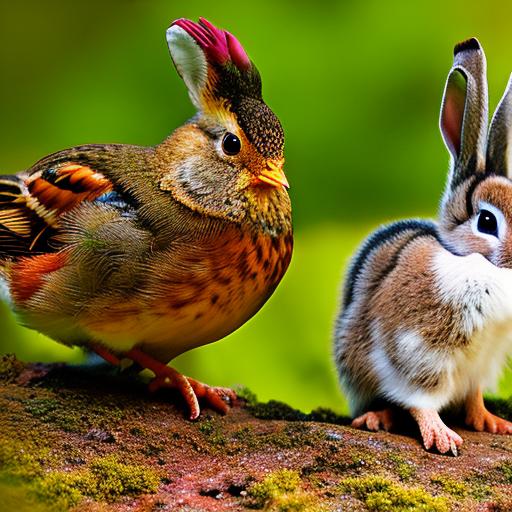Have you ever considered keeping bunnies and chickens together? It’s a popular trend among homesteaders and backyard farmers, but is it a good idea? Let’s explore the benefits and risks of keeping these two animals together.
Key Takeaways
- Keeping bunnies and chickens together can have benefits, such as providing companionship and reducing pests.
- However, there are also risks, including the potential for aggression and disease transmission.
- Factors to consider before keeping bunnies and chickens together include space, temperament, and diet.
- Housing requirements for bunnies and chickens should include separate areas for sleeping and nesting.
- Feeding requirements for bunnies and chickens should be carefully monitored to ensure each animal is getting the proper nutrients.
The Benefits of Keeping Bunnies and Chickens Together
One of the main benefits of keeping bunnies and chickens together is that they can provide companionship for each other. Both animals are social creatures and can benefit from having a companion of their own species. They can interact, play, and even groom each other, which can help reduce stress and improve their overall well-being.
Another benefit is that bunnies and chickens can help keep each other warm in colder weather. Bunnies have thick fur that provides insulation, while chickens generate body heat. By sharing the same living space, they can help regulate each other’s body temperature and stay warm during the winter months.
Additionally, bunnies and chickens can help keep pests away from your garden. Chickens are natural foragers and will eat insects, slugs, and other pests that may damage your plants. Bunnies, on the other hand, can help keep weeds under control by munching on them. By keeping these two animals together, you can create a natural pest control system for your garden.
The Risks of Keeping Bunnies and Chickens Together
While there are benefits to keeping bunnies and chickens together, there are also risks that need to be considered. One of the main risks is that chickens can be aggressive towards bunnies, especially if they feel threatened. Chickens have a pecking order and may try to establish dominance over the bunnies. This can lead to injuries or even death for the bunnies if they are not able to defend themselves.
Another risk is that bunnies can be territorial and may not want to share their space with chickens. Bunnies are known to mark their territory and may become stressed or agitated if they feel their space is being invaded. This can lead to behavioral issues and even health problems for the bunnies.
There is also a risk of disease transmission between the two animals. Bunnies and chickens can both carry diseases that can be transmitted to humans, such as salmonella. It’s important to keep their living areas clean and practice good hygiene to minimize the risk of disease transmission.
Factors to Consider Before Keeping Bunnies and Chickens Together
Before deciding to keep bunnies and chickens together, there are several factors that need to be considered. First, do you have enough space for both animals? Bunnies and chickens have different housing needs and require enough space to move around comfortably. It’s important to ensure that they have enough room to exercise and explore.
Second, are you prepared to deal with any potential conflicts between the two? As mentioned earlier, there is a risk of aggression between chickens and bunnies. It’s important to be prepared to intervene if any conflicts arise and provide a safe environment for both animals.
Lastly, do you have the time and resources to properly care for both animals? Bunnies and chickens require daily care, including feeding, cleaning, and providing fresh water. It’s important to ensure that you have the time and resources to meet their needs before bringing them into your home.
Housing Requirements for Bunnies and Chickens
Bunnies and chickens have different housing needs. Bunnies need a secure enclosure to protect them from predators. They should have a hutch or cage that is large enough for them to move around comfortably, with plenty of bedding material for them to burrow in. The enclosure should also have a solid floor to prevent predators from digging in.
Chickens, on the other hand, need a coop that is well-ventilated and provides enough space for them to move around. The coop should have nesting boxes for them to lay eggs, perches for them to roost on, and a secure door to keep predators out. It’s important to provide enough space for each chicken, as overcrowding can lead to stress and health issues.
Feeding Requirements for Bunnies and Chickens

Bunnies and chickens have different dietary needs. Bunnies are herbivores and require a diet that is high in fiber. They should have access to unlimited hay, fresh vegetables, and a small amount of pellets. It’s important to provide a balanced diet for bunnies to ensure their overall health and well-being.
Chickens, on the other hand, are omnivores and require a balanced diet of grains, protein, and calcium. They should have access to a commercial chicken feed that is specifically formulated for their nutritional needs. In addition to the feed, chickens can also benefit from kitchen scraps, insects, and greens.
Socialization and Interaction Between Bunnies and Chickens
Bunnies and chickens can get along if they are introduced properly. It’s important to introduce them slowly and supervise their interactions to ensure that they are getting along. Provide plenty of space for both animals to move around and establish their own territories.
It’s also important to provide separate feeding areas for bunnies and chickens. This will help prevent any conflicts over food and ensure that each animal is getting the proper nutrition they need.
Health Concerns When Keeping Bunnies and Chickens Together
When keeping bunnies and chickens together, there are health concerns that need to be considered. Both animals can carry diseases that can be transmitted to humans, such as salmonella. It’s important to keep their living areas clean and practice good hygiene to minimize the risk of disease transmission.
Regularly clean and disinfect their enclosures, provide fresh bedding, and wash your hands thoroughly after handling either animal. It’s also important to monitor their health closely and seek veterinary care if you notice any signs of illness.
Tips for Successfully Keeping Bunnies and Chickens Together
To successfully keep bunnies and chickens together, here are some tips to keep in mind:
1. Introduce them slowly and supervise their interactions. Allow them to get used to each other’s presence before allowing direct contact.
2. Provide plenty of space and separate feeding areas. This will help prevent any conflicts over territory or food.
3. Keep their living areas clean and practice good hygiene. Regularly clean and disinfect their enclosures, provide fresh bedding, and wash your hands thoroughly after handling either animal.
Is Keeping Bunnies and Chickens Together Right for You?
Keeping bunnies and chickens together can be a rewarding experience, but it’s important to consider the risks and requirements before making the decision. If you have the space, time, and resources to properly care for both animals, it can be a great addition to your homestead or backyard farm. However, it’s important to be prepared for any potential conflicts or health concerns that may arise. By taking the necessary precautions and providing a safe environment, you can create a harmonious living arrangement for both bunnies and chickens.
If you’re considering keeping bunnies and chickens together, it’s important to create a suitable living environment for both species. One option to explore is a garden chicken coop, which provides a safe and spacious area for your chickens to roam while also allowing your bunnies to have their own separate space. Poultry Wizard offers a helpful article on garden chicken coops that can guide you in creating a harmonious living arrangement for your furry and feathered friends. Check out their article here for more information on how to create an ideal setup for your bunny and chicken companions.
FAQs
What are the benefits of keeping bunnies and chickens together?
Keeping bunnies and chickens together can provide mutual benefits such as companionship, pest control, and manure management. Bunnies can help keep the chicken coop clean by eating leftover feed and chicken droppings, while chickens can help control pests and provide a source of food for the bunnies.
Is it safe to keep bunnies and chickens together?
Yes, it is generally safe to keep bunnies and chickens together as long as they are properly introduced and supervised. However, it is important to note that chickens can be aggressive towards bunnies, especially during mating season, so it is important to provide separate living spaces if necessary.
What should I consider before keeping bunnies and chickens together?
Before keeping bunnies and chickens together, it is important to consider the space available, the temperament of the animals, and their individual needs. Bunnies and chickens have different dietary requirements and living conditions, so it is important to ensure that their needs are met.
What should I feed my bunnies and chickens if they are kept together?
Bunnies and chickens have different dietary requirements, so it is important to provide separate feeders and feed appropriate food for each animal. Bunnies require a diet high in fiber, while chickens require a diet high in protein. It is important to avoid feeding bunnies chicken feed as it can cause digestive issues.
How can I introduce bunnies and chickens to each other?
Introducing bunnies and chickens to each other should be done gradually and under supervision. It is recommended to keep them in separate enclosures next to each other for a few days to allow them to get used to each other’s presence. After that, they can be allowed to interact under close supervision to ensure that they get along.
Meet Walter, the feathered-friend fanatic of Florida! Nestled in the sunshine state, Walter struts through life with his feathered companions, clucking his way to happiness. With a coop that’s fancier than a five-star hotel, he’s the Don Juan of the chicken world. When he’s not teaching his hens to do the cha-cha, you’ll find him in a heated debate with his prized rooster, Sir Clucks-a-Lot. Walter’s poultry passion is no yolk; he’s the sunny-side-up guy you never knew you needed in your flock of friends!







